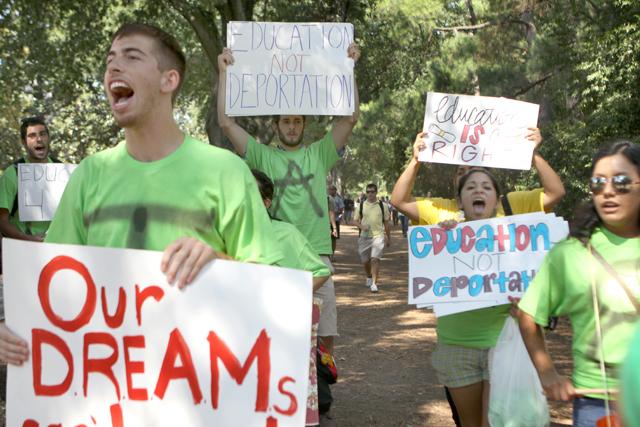This past December, the University of California, Berkeley announced the creation of a $1 million scholarship fund benefitting undocumented students, commonly referred to as “Dreamers” since the failure of the DREAM Act.
Established with a gift from The Evelyn and Water Haas Jr. Foundation, the Dreamers Fund, the largest known scholarship for undocumented students in the U.S., will help fund about 200 students’ dreams of going to college. This groundbreaking scholarship is significant because undocumented students cannot receive any type of federal financial aid, such as Pell grants. In North Carolina, and many states too, these students must pay out-of-state tuition as well.
Currently there are no public scholarship funds for Dreamers in North Carolina, nor is it likely that there will be any time soon, according to Tracey Ray, the assistant vice provost for Student Diversity at N.C State.
The dispute over the rights of undocumented people is currently in a volatile state, Ray suggests. Some argue that children of undocumented immigrants should not have the same rights as American citizens. Others argue that these children should not be held accountable for the actions of their parents, over which they had no control.
This is a sensitive problem, admitted Ray — one that still needs to be addressed promptly. States like Texas and California have been dealing with a large influx of undocumented immigrants for decades, and they have taken the time to understand the new social dynamic of their states. Consequently, these states have altered certain policies involving the rights of undocumented persons, making education more accessible.
North Carolina has not yet reached the same status as these states, but the number of undocumented immigrants in the state is steadily growing, according to Ray. There would be many benefits if North Carolina would provide financial aid for undocumented students.
“An educated state is a healthy state,” Ray said, contending that Dreamers could contribute to the U.S. in a variety of ways if they were provided with the right tools for success.
“It’s just sad when good students, even valedictorians, who have high hopes for attending college have to have their dreams referred due to their undocumented status,” Ray said.
Ray mentioned the need to fill a growing workforce. The baby boomer generation is retiring, leaving the workforce with a “shortage of bodies,” which needs to be filled. Dreamers could help fill those positions. If people living in the U.S. “aren’t left with any educational skills, it ultimately takes away from the economy and productivity of the nation.”
“This is critical for the workforce and overall integrity of the nation,” Ray said.
In August, Metropolitan State University, in Denver, Colo., approved a controversial new policy instituting a specifically tailored tuition rate for residents of the state who are undocumented. The rate, which was $3,000 higher than the tuition for legal residents of the state, was still $8,000 lower than what out-of-state students were being charged.
The new rate, voted on by the university’s board of trustees in June 2012, received praise from immigrant rights activists, who for years attempted to have legislation passed that would allow state colleges to offer lower rates to local, undocumented immigrant students.
Hispanic student Marcus Tavárez, a senior in political science, describes the Dreamer situation like a double-edged sword.
“The U.S. is known for having numerous opportunities for self-improvement, and the U.S. should not close those opportunities off for such a large group of people,” Tavárez said.
Allowing undocumented students to receive federal financial aid could serve as an initiative for those people to be productive members of society.
“I knew a lot of people in high school who did not try to do well because they knew they could not afford to go to college,” Tavárez said. “At the same time, it is not fair for tax-payers to have to aid non-tax-payers and their families.”
There is also the possibility undocumented immigrants in the United States will get an education and then return to their home countries.
Tavárez notes that the decision is certainly not going to be an easy one, and whatever decision political figures make, there is definitely going to be “criticism from both sides.”








